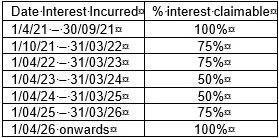Snippets
National’s tax policies - property
Given the outcome of the general election, we expect to see legislation that will make the following tax changes.
The ability to claim interest deductions on debt relating to some residential rental properties acquired before 27 March 2021 will be progressively phased out. National’s tax policy promises to retain a 50% allowable deduction in the year ended 31 March 2025 (rather than reduce it to 25%), increase it to 75% in the year ended 31 March 2026, and fully restore 100% interest deductibility from April 2026 onward. From start to finish this means the interest deductibility on affected properties will be:
National also proposed to reduce the brightline period for residential investment properties from 10 years (or five years if the property is a ‘new build’) to two years by July 2024. As a result, properties acquired before July 2022 should not be subject to the brightline test on sale.
Given how complex the current rules are, there is a risk that unwinding them will be equally complex, hence we are unlikely to be out of the woods yet.
Covid fraud
Given the necessity of providing fast relief, the wage subsidy scheme provided during COVID in NZ was largely based on trust.
Today, MSD operates a Wage Subsidy Integrity and Fraud Programme aimed at ensuring the integrity of the payments and who received them. So far, 38 people have been brought before the courts in relation to wage subsidy misuse, 37 businesses have civil recovery action underway to recover payments and 11 cases of significant and complex alleged wage subsidy fraud have been referred to the Serious Fraud Office. By and large, businesses in NZ were sincere in their wage subsidy claims, but overseas there are some more extreme examples where this was not the case.
Each year, the Association of Certified Fraud Examiners selects the five most scandalous fraud stories of the year. One of those stories was the arrest of 47 people affiliated with a Minnesota based non-profit ‘Feeding our Future’, which defrauded USD$250 million in COVID relief funds through claiming to feed children during the pandemic. The elaborate scheme used various fake documents, invoices and shell companies to give the appearance of providing meals to children, while using the money to purchase luxury cars, jewellery and coastal property abroad.

